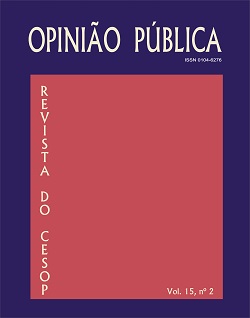Resumo
Alguns estudiosos não examinam identidade racial de grupo entre os afro-brasileiros por causa da história do Brasil como uma nação racialmente mista. Dada a crescente força dos movimentos negros e a adoção de políticas raciais como ações afirmativas, que pressupõem a existência de grupos raciais, é necessário examinar se a identidade racial de grupo é saliente. Utilizando dados coletados em survey original de 2006, em Salvador e São Paulo, há evidências de que uma maioria esmagadora de afrobrasileiros se identifica como um grupo racial. Além disso, existe uma relação positiva e estatisticamente significante entre a identificação como um grupo racial e de voto para políticos negros em Salvador, porém não em São Paulo.
Abstract:
A number of scholars do not examine racial group identity among Afro-Brazilians because of Brazil’s history as a racially mixed nation. Given the growing strength of the black movements and the enactment of racial policies such as affirmative action that presume the existence of racial groups it is necessary to examine if racial group identity is salient. Using original survey data collected in 2006 in Salvador and São Paulo, Brazil, there is evidence that an overwhelming majority of Afro-Brazilians in identify as a racial group. Furthermore, there is a positive and statistically significant relationship between identifying as a racial group and voting for black politicians in Salvador but not in São Paulo.
Keywords: racial politics; public opinion; afro-brazilian group identity
Referências
BAILEY, S. R. e TELLES, E. E. “Multiracial vs. Collective Black Categories: Census Classification Debates in Brazil”. Ethnicities , v.6, nº 1, 2006.
BRUBAKER, R. e COOPER, F. “Beyond Identity”. Theory and Society, nº 8, 2000.
BUTLER, K. Freedoms Given, Freedoms Won: Afro-Brazilians in Post-Abolition São Paulo and Salvador. News Brunswick: NJ: Rutgers University Press, 1998.
CASTRO, M. “Raça e Comportamento Político”. Dados , nº 36, 1993.
DAWSON, M. Behind the Mule: Race and Class in African American Politics. Princeton, NJ: Princeton University Press, 1994.
DAWSON, M. Black Visions: The Roots of Contemporary African-American Political Ideologies. Chicago: University of Chicago Press, 2001.
GUIMARÃES, A. S. The Race Issue in Brazilian Politics (The Last Fifteen Years). Fifteen Years of Democracy in Brazil Conference. Trabalho apresentado no Instituto de Estudos Latino-Americanos da Universidade de Londres, Inglaterra, fev. 2001.
HAGOPIAN, F. Traditional Politics and Regime Change in Brazil. New York: Cambridge University Press, 1996.
HANCHARD, M. Orpheus and Power: The Movimento Negro of Rio de Janeiro and São Paulo, Brazil, 1945-1988. Princeton, NJ: Princeton University Press, 1994.
JOHNSON III, O. Locating Blacks in Brazilian Politics: Afro-Brazilian Activism, New Political parties, and Pro-Black Public Policies. Mimeo, 2006.
JOHNSON III, O. “Black Participation in Brazilian Politics”. Journal of Interamerican Studies and World Affairs, v.40, n º4, 1998.
MAINWARING et al. Conservative Parties, Democracy, and Economic Reform in Contemporary Brazil. In: MIDDLEBROOK, K. Conservative Parties, the Right, and Democracy in Latin America, 2000.
MITCHELL, G. “Afro-Brazilian Politicians and Campaign Strategies: A Preliminary Analysis”. Latin American Politics and Society, 2009.
MITCHELL, G. Politicizing Blackness: Afro-Brazilian Color Identification and Candidate Preference. In: REITER, B. e MITCHELL, G. Brazil’s New Racial Politics. Lynne Rienner Publishers, 2009.
MITCHELL, M. Racial Consciousness and the Political Attitudes and Behavior of Blacks in São Paulo, Brazil . Tese de doutorado, Indiana University, 1977.
MITCHELL, M. Race and Democracy in Brazil: The Racial Factor in Public Opinion. National Conference of Black Political Scientists, San Francisco, California, mar.2007.
OLIVEIRA, C. L. P. A Inevitável Visibilidade de Cor: Estudo comparativo das campanhas de Benedita da Silva e Celso Pitta às prefeituras do Rio de Janeiro e São Paulo, nas eleições de 1992 e 1996. Tese de doutorado, Instituto Universitário de Pesquisa do Rio de Janeiro (Iuperj), 2007.
OLIVEIRA, C. L. P. A Luta por um Lugar: Gênero, Raça, e Classe: Eleições Municipais de Salvador-Bahia, 1992. Série Toques, Programa A Cor da Bahia-UFBA, 1997.
SANSONE, L. Blackness Without Ethnicity: Constructing Race in Brazil. New York: Palgrave Macmillan, 2003.
SANTOS, S. A. A Ausência de uma Bancada Suprapartidária Afro-Brasileira no Congreso Nacional (Legislatura 1995/1998). Brasília: Centro de Estudos Afro-Asiaticos, 2 Volumes, 2000.
SAWYER, M. Racial Politics in Post-Revolutionary Cuba. New York: Cambridge University Press, 2006.
SHERIFF, R. E. Dreaming Equality: Color, Race, and Racism in Urban Brazil. Piscataway: Rutgers University Press, 2001.
SOARES, G. A. D. e VALLE SILVA, N. do. “Urbanization, Race, and Class in Brazilian Politics”. Latin American Research Review, v.22, nº 2, 1987.
SOUZA, A. de. “Raça e Política no Brasil urbano”. Revista de Administração de Empresas, Rio de Janeiro, v. 11, nº 4, 1971.
TELLES, E. Race in Another America: The Significance of Skin Color in Brazil. Princeton, NJ: Princeton University Press, 2004.
TWINE, F. W. Racism in a Racial Democracy: The Maintenance of White Supremacy in Brazil. New Brunswick: Rutgers University Press, 1998.
VON METTENHEIM, K. The Brazilian Voter: Mass Politics in Democratic Transition: 1974-1986. Pittsburgh, PA: University of Pittsburgh Press, 1987.
WADE, P. Blackness and Race Mixture: The Dynamics of Racial Identity in Colombia. Baltimore: Johns Hopkins University Press, 1993.
WERNECK, F. “Com 49,7%, Pretos e Pardos Superam Brancos”. Estado de São Paulo, 18 set.2008, disponível em: <http://www.estadao.com.br/economia/not_eco244361,0.htm>, 2008.
A Opinião Pública utiliza a licença do Creative Commons (CC), preservando assim, a integridade dos artigos em ambiente de acesso aberto.

